Delia Bacon, Writer and Shakespeare Theorist
Delia Bacon was born in a log cabin in Ohio in the February of 1811. Her father David was a Congregationalist minister who had been born in Connecticut forty years earlier. In 1801 he had tried to establish a mission in Detroit, but it had failed. The following year he went out to convert Native Americans, but this also failed. [1] In 1804 he went to Ohio and established the town of Tallmadge. Unfortunately few people moved into the town [2] and David was unable to recoup the amount he’d borrowed to buy the town’s land before he was evicted by his creditors in 1812. He brought his family (including Delia and her six siblings) back to Connecticut. His health and spirit ruined by his frontier failures, he died in 1817 when Delia was only six years old.
Both of Delia’s parents came from “good stock”, but the family finances had been denuded by David’s adventures and so the only one of the children to receive a full formal education and the opportunities it afforded was the eldest son, Leonard. Delia had a single year of secondary education, but was lucky enough to receive it boarding at Catharine Beecher’s Hartford Female Seminary. Beecher was an educational visionary and a champion of women’s education, and she became an influential and sympathetic figure in Delia’s life. She described the vivacious young Delia as:
…a genius; and one, too, so exuberant and unregulated as to demand great pruning and restraint.
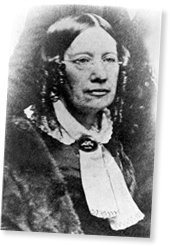
Delia’s main ambition was to be a writer, but the rough edges left by her frontier childhood meant that she found it hard to be taken seriously. Still, she persisted. On leaving school she took up teaching jobs but continued to write. By the age of twenty, she had published her first book – anonymously, of course. It was called Tales of the Puritans – three stories of young girls in the early American religious colonies, each set apart from their peers by some genius or gentleness of manner. The most notable may be the last of the three, where the heroine abandons her colony and has adventures on the frontier before going to France as the wife of a Catholic nobleman. The book didn’t do well, unfortunately. Her biggest early success was when she won a short story competition run by the Philadelphia Saturday Courier, though this only became notable in retrospect. One of the unsuccessful entrants was a young man named Edgar Allan Poe.
Buoyed by literary success, Delia tried to start her own school but soon found her health not up to the amount of work involved. She had caught malaria as a child and continued to suffer attacks from it for the rest of her life. Instead she became a freelance lecturer, a private educator in history and literature for women unable to receive formal tertiary education. She continued to write as well and moved to New York in 1836 to try and advance her literary career, though success still eluded her. In 1839 she wrote a play called The Bride of Fort Edward about a woman named Jane McCrea who had been murdered in 1777. Jane was allegedly killed by Native American scouts, [3] an event which contributed greatly to the delegitimisation of the British Army in America. Delia’s play is more about this impact of her death, and the ways in which human lives intersect with the great forces of history. Though the lead role was performed by the English actress Ellen Tree (who was very popular at the time) the play was a commercial failure, and Delia moved back to Connecticut soon after.
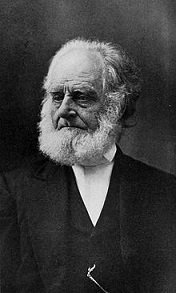
Despite this setback, Delia’s reputation as one of the leading female scholars of New England continued to increase. She lodged in New Haven at the Tontine Hotel, where she became friends with a young theologian named Alexander MacWhorter. Exactly what passed between the two is unclear, but rumours soon began to circulate that they were more than friends and even that she and Alexander were engaged. Upset by these rumours Alexander began denying them fiercely, and bolstered this by denouncing Delia as “indecorous” and claimed that she had tried to seduce him. (Witnesses later commented that if anything that shoe had been on the other foot.) The matter devolved into “he said, she said” until Delia’s brother Leonard took action. By now he was a famous minister and was probably far more concerned about the effect of the scandal on his reputation than anything else. He took Alexander to ecclesiastical court to have him formally censured for his behaviour.
The whole thing became a media circus, at least partially due to the high social standing of the pair. In essence though the trial became a proxy war between elements in the Congregationalist church at the time – Leonard and his enemies. As always it was the woman who was really the one on trial, and Delia’s reputation was so savaged in the courtroom that her previous occupation of “genteel freelance lecturer” was destroyed. The cherry on top was the eventual result – eleven voted to censure Alexander, but twelve voted against. So poorly was Delia treated that her former mentor Catharine Beecher wrote a book called Truth Stranger Than Fiction about the case.
The female sex are accustomed to look upon the ministers of Jesus Christ as their special guardians and protectors. The preservation of this grateful respect and confidence is one of the most sacred trusts committed to the ministry.
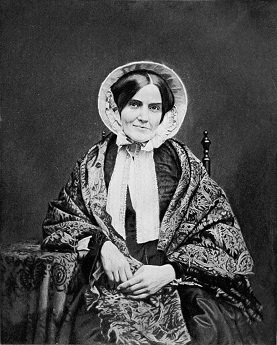
Though her former career was closed to her, Delia found that her treatment had won the sympathies of both the literary establishment and the general public. She parlayed this into a short-lived career in public lecturing, performing in Boston and Cambridge to a more liberal crowd than those in Connecticut. Though she didn’t stay in that trade for long, she had a huge effect on those who saw her. One later remembered her “vibrant voice which penetrated to one’s inmost soul”. She took her lectures to New York and soon gained a reputation as a lady genius. But through all this she didn’t abandon her scholarly pursuits. Delia had been reading Shakespeare, you see. And Delia had a Theory about him. Delia’s theory would consume her life, and set off an argument that continues to this day. She wasn’t the first person to have this theory, but she became infamous for it. Delia’s theory, put simply, was this.
Shakespeare didn’t write Shakespeare’s plays.
Now Delia’s theory was, to an extent, based on some solid and groundbreaking scholarship. While most analysis of the plays had concentrated on their literary significance, Delia looked at them with a historian’s eye. The late 16th century was a time of great social upheaval, both in England and throughout Europe. In the plays of Shakespeare, Delia saw those changes writ small, both chronicled and predicted. Macbeth, King Lear and Coriolanus were the richest ground for her interpretation, which soon spiraled uncontrollably into confirmation bias. But Delia went still deeper. The plays of Shakespeare, she decided, were actually covert propaganda for democratic government. A secret society at Elizabeth’s court had sought to influence the people to throw off its chains. And at its heart, the most idolised Elizabethan of her time. Francis Bacon.
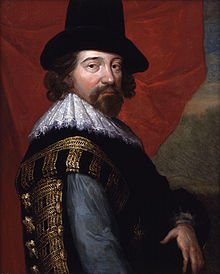
Delia’s theory is often simplified down to “Bacon wrote Shakespeare’s plays”, but that’s a gross injustice. For the purposes of her theory (combined with her own American upper-middle-class snobbery), the plays couldn’t have been written by some socially-conscious lower born Stratfordian. Instead they had to have come from someone highly placed in politics. Who better than the man who, in the 19th century, was being lionised as the father of modern science? [4] Besides, Delia didn’t really suggest he wrote the plays entirely himself – simply that he was the architect of their grand design. (And one which, she theorised, was to be followed by a grand revolution that for whatever reason never came to pass.) She also didn’t claim that Shakespeare himself never existed – merely that he was a front for this shadowy cabal.
Delia was enthusiastic about her theory and discussed it with friends in Boston, though she soon quietened down as she became afraid of being “scooped” by another scholar. She decided that she needed to go to England to continue her research, and began discreetly seeking funding for the trip. Her celebrity aided her here – the American writer Ralph Waldo Emerson was a fan of her lectures and he introduced her to a New York millionaire named Charles Butler. Charles agreed to pay her passage across the Atlantic, and the pair traveled across to England in 1853.
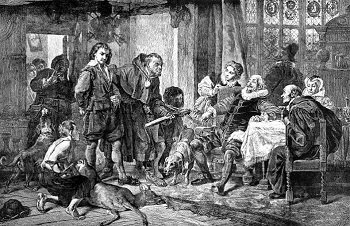
Though Delia and Charles made a pilgrimage to Francis Bacon’s grave on arriving in England (before Charles returned to America), Delia never really did any of the research that was the supposed reason for her visit. In fact, it seems that she simply thought that being in England would be enough to fill her with inspiration. Her few attempts to contact the English literary establishment were rebuffed with laughter and mockery. Nobody had time for a “crazy American woman” with a strange theory about Shakespeare. This turned to outright hostility in 1856, when after three years of mostly sitting in a room and rewriting her manuscripts, an article by Delia denouncing Shakespeare as incapable of writing his plays was published by Putnam’s Magazine. The magazine was mostly dedicated to republishing American writing, but Emerson had put in a word with the publisher to get Delia’s article in the magazine. It did bring in some much-needed money, as Delia was essentially living as a pauper at this time. However her description of Shakespeare as a “vulgar, illiterate deer poacher” preemptively burned any bridges she could have formed with English scholars. The poor reception also ensured that Putnam’s refused to publish any more of her articles.
Eventually Delia’s poverty drove her to the US consulate in Liverpool, and to a friend of her friends in America. He was the novelist Nathaniel Hawthorne, most famous for The Scarlet Letter. Hawthorne was impressed by her, and described her:
She was rather uncommonly tall, and had a striking and expressive face, dark hair, dark eyes, which shone with an inward light as soon as she began to speak, and by and by a color came into her cheeks and made her look almost young.
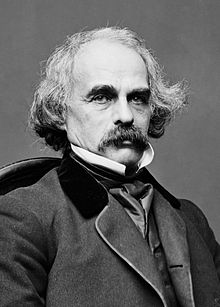
As you can tell, Hawthorne liked Delia. Though he didn’t believe her theory he could tell that she did, deeply. He was intrigued by this woman, who he described as fundamentally broken in some way, but still radiantly happy in her revelation. Moreover, he was impressed by the depth of her study and thought that it, at least, deserved a wider audience. So it was with his help that her magnum opus, The Philosophy of the Plays of Shakespeare Unfolded, was published. Hawthorne wrote the introduction, but was honest enough to admit that he didn’t personally believe the theory. Delia was furious and regarded this as a personal betrayal and refused to speak to him.
Hawthorne was probably right in his assessment of Delia as being mentally unwell. He described her as a “monomaniac” – an obsolete psychological diagnosis for a fixation or obsession with a particular subject. As always, with the gap of years it’s impossible to speak accurately about this. Whatever was wrong with her it was exacerbated by her poverty and poor diet, and the rejection and solitude only made it worse. Earlier it had taken the form of a deep conviction that some form of secret proof was concealed in Shakespeare’s grave – some evidence of his fraud, buried with the Bard. She made her way to Stratford-Upon-Avon and visited the gravesite. With her she brought an array of burglar’s tools, but she could not bring herself to break into the tomb. In a later letter to Hawthorne she explained that she had promised the clerk who watched over the grave that she would do “nothing untowards”, and that thinking of that promise was what held her back. She was still standing there when the exhibit closed that night and the guard, not unsympathetically, sent her home.
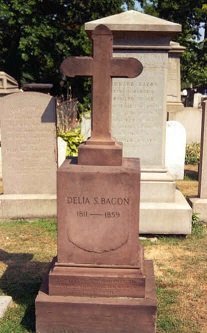
The derision with which The Philosophy of the Plays of Shakespeare Unfolded was received seems to have been the final blow that Delia’s psyche could take. Her health also seems to have taken a downturn, as the effects of her childhood malaria began to affect her and she could not afford treatment. As a result she began suffering fevers which further affected her mental state. Fearing that she was becoming suicidal, the authorities in Stratford had her committed to an asylum and sent word to her relatives in America. Her brother Leonard had been sending her letters for some time begging her to come home – he had been convinced that she was on the edge of a breakdown for years, and given the way things turned out he may have been write. Delia was sent back to America in 1858, where she was taken into care in Hartford. She never recovered, and died there in September of 1859. She was only 48 years old. [5]
Looking at the life of Delia Bacon, it’s hard not to view it as a tragedy. Her fiction never managed to find an audience, though even at the time it was favourably regarded by critics. She might have penned a hit eventually, but the MacWhorter fiasco brought an end to that. Her scholarship also showed a great deal of promise, and if she had restricted herself to a literary analysis of Shakespeare’s plays then she would probably be remembered as one of America’s great 19th century female scholars. But her issue was her snobbery – born herself of upper-class New England stock, she found it impossible to conceive that a glove-maker’s son could have the genius and insight she knew that the author of Shakespeare’s plays would need to have. And so, in an ironic parallel to the Shakespearean tragedies, it was that one fatal flaw that destroyed her.
Images via wikimedia except where stated.
[1] In a memorable speech the Native leader Little Otter told David “Your religion is very good, but only for white people…We formerly had a religion very much like yours, but we found it would not do for us, and we have discovered a much better way.”
[2] Though nowadays around seventeen thousand people live there.
[3] The exact details of her death remain unclear to this day, though.
[4] For those unfamiliar with him – Bacon was a 16th century English politician and scholar who was active in Elizabeth’s court but who truly rose to prominence under her successor, James I, who he served as Lord Chancellor. He’s best remembered for being the first prominent English-speaker to argue for the importance of skepticism and lack of preconception in scientific analysis, and is regarded as the originator of the “scientific method”. Delia never brought up the coincidence of their surnames, though it may have influenced her thinking.
[5] The idea that Bacon was the author of Shakespeare’s plays did not die with Delia. For example, in 1916 a court in Chicago ruled that Bacon was proven to be the author of the plays and as such the producer William Selig owed George Fabyan $5000 in damages for libel. Nowadays though it is usually regarded as unlikely at best.

https://www.youtube.com/watch?v=GEQNWpo1PSs
Delia was right. She was wrong about the democracy though. sorta the opposite in fact